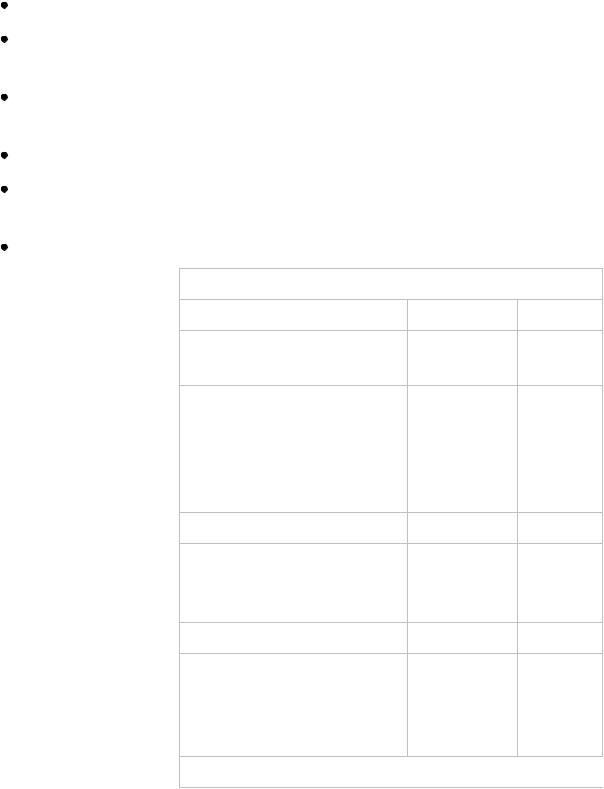
- •1.1 Why Take the GMAT® Exam?
- •1.2 GMAT® Exam Format
- •1.3 What Is the Content of the Test Like?
- •1.4 Integrated Reasoning Section
- •1.5 Quantitative Section
- •1.6 Verbal Section
- •1.7 Analytical Writing Assessment
- •1.8 What Computer Skills Will I Need?
- •1.9 What Are the Test Centers Like?
- •1.10 How Are Scores Calculated?
- •1.11 Test Development Process
- •2.0 How to Prepare
- •2.1 How Should I Prepare to Take the Test?
- •2.2 What About Practice Tests?
- •2.3 How Should I Use the Diagnostic Test?
- •2.4 Where Can I Get Additional Practice?
- •2.5 General Test-Taking Suggestions
- •3.0 Diagnostic Test
- •3.1 Quantitative Questions
- •3.2 Verbal Questions
- •3.3 Quantitative and Verbal Answer Keys
- •3.4 Interpretive Guide
- •3.5 Quantitative Answer Explanations
- •3.6 Verbal Answer Explanations
- •4.0 Math Review
- •4.1 Arithmetic
- •4.2 Algebra
- •4.3 Geometry
- •4.4 Word Problems
- •5.0 Problem Solving
- •5.1 Test-Taking Strategies
- •5.2 The Directions
- •5.3 Practice Questions
- •5.4 Answer Key
- •5.5 Answer Explanations
- •6.0 Data Sufficiency
- •6.1 Test-Taking Strategies
- •6.2 The Directions
- •6.3 Practice Questions
- •6.4 Answer Key
- •6.5 Answer Explanations
- •7.0 Reading Comprehension
- •7.1 What Is Measured
- •7.2 Test-Taking Strategies
- •7.3 The Directions
- •7.4 Practice Questions
- •7.5 Answer Key
- •7.6 Answer Explanations
- •8.0 Critical Reasoning
- •8.1 What Is Measured
- •8.2 Test-Taking Strategies
- •8.3 The Directions
- •8.4 Practice Questions
- •8.5 Answer Key
- •8.6 Answer Explanations
- •9.0 Sentence Correction
- •9.1 Basic English Grammar Rules
- •9.2 Study Suggestions
- •9.3 What Is Measured
- •9.4 Test-Taking Strategies
- •9.5 The Directions
- •9.6 Practice Questions
- •9.7 Answer Key
- •9.8 Answer Explanations
- •10.0 Integrated Reasoning
- •10.1 What Is Measured
- •10.2 The Question Types
- •10.3 Test-Taking Strategies
- •10.4 The Directions
- •11.0 Analytical Writing Assessment
- •11.1 What Is Measured
- •11.2 Test-Taking Strategies
- •11.3 The Directions
- •11.4 GMAT® Scoring Guide: Analysis of an Argument
- •11.5 Sample: Analysis of an Argument
- •11.6 Analysis of an Argument Sample Topics
- •Online Question Bank Information

Table of Contents
1.0 What Is the GMAT® Exam?
1.1 Why Take the GMAT® Exam?
1.2 GMAT® Exam Format
1.3 What Is the Content of the Test Like? 1.4 Integrated Reasoning Section
1.5 Quantitative Section
1.6 Verbal Section
1.7 Analytical Writing Assessment
1.8 What Computer Skills Will I Need?
1.9 What Are the Test Centers Like?
1.10 How Are Scores Calculated?
1.11 Test Development Process
2.0 How to Prepare
2.1 How Should I Prepare to Take the Test? 2.2 What About Practice Tests?
2.3 How Should I Use the Diagnostic Test?
2.4 Where Can I Get Additional Practice?
2.5 General Test-Taking Suggestions
3.0 Diagnostic Test
3.1 Quantitative Questions
3.2 Verbal Questions
3.3 Quantitative and Verbal Answer Keys
3.4 Interpretive Guide
3.5 Quantitative Answer Explanations
3.6 Verbal Answer Explanations
4.0 Math Review
4.1 Arithmetic
4.2 Algebra
4.3 Geometry
4.4 Word Problems
5.0 Problem Solving
5.1 Test-Taking Strategies
5.2 The Directions
5.3 Practice Questions
5.4 Answer Key
5.5 Answer Explanations
6.0 Data Sufficiency
6.1 Test-Taking Strategies
6.2 The Directions
6.3 Practice Questions
6.4 Answer Key
6.5 Answer Explanations
7.0 Reading Comprehension
7.1 What Is Measured
7.2 Test-Taking Strategies
7.3 The Directions
7.4 Practice Questions
7.5 Answer Key
7.6 Answer Explanations
8.0 Critical Reasoning
8.1 What Is Measured
8.2 Test-Taking Strategies
8.3 The Directions
8.4 Practice Questions
8.5 Answer Key
8.6 Answer Explanations
9.0 Sentence Correction
9.1 Basic English Grammar Rules
9.2 Study Suggestions
9.3 What Is Measured
9.4 Test-Taking Strategies
9.5 The Directions
9.6 Practice Questions
9.7 Answer Key
9.8 Answer Explanations
10.0 Integrated Reasoning
10.1 What Is Measured
10.2 The Question Types
10.3 Test-Taking Strategies
10.4 The Directions
11.0 Analytical Writing Assessment
11.1 What Is Measured
11.2 Test-Taking Strategies
11.3 The Directions
11.4 GMAT® Scoring Guide: Analysis of an Argument
11.5 Sample: Analysis of an Argument
11.6 Analysis of an Argument Sample Topics
Appendix A: Answer Sheets
Advertisement
Online Question Bank Information
End User License Agreement
THE OFFICIAL GUIDE FOR GMAT® REVIEW 2016

FROM THE GRADUATE MANAGEMENT ADMISSION COUNCIL®
THE OFFICIAL GUIDE FOR GMAT® REVIEW 2016
Copyright © 2015 by the Graduate Management Admission Council®. All rights reserved. Published by John Wiley & Sons, Inc., Hoboken, New Jersey.
No part of this publication may be reproduced, stored in a retrieval system or transmitted in any form or by any means, electronic, mechanical, photocopying, recording, scanning or otherwise, except as permitted under Sections 107 or 108 of the 1976 United States Copyright Act, without either the prior written permission of the Publisher, or authorization through payment of the appropriate per-copy fee to the Copyright Clearance Center, 222 Rosewood Drive, Danvers, MA 01923, (978) 750-8400, fax (978) 646-8600, or on the web at www.copyright.com. Requests to the Publisher for permission should be addressed to the Permissions Department, John Wiley & Sons, Inc., 111 River Street, Hoboken, NJ 07030, (201) 748-6011, fax (201) 748-6008, or online at http://www.wiley.com/go/permissions.
The publisher and the author make no representations or warranties with respect to the accuracy or completeness of the contents of this work and specifically disclaim all warranties, including without limitation warranties of fitness for a particular purpose. No warranty may be created or extended by sales or promotional materials. The advice and strategies contained herein may not be suitable for every situation. This work is sold with the understanding that the publisher is not engaged in rendering legal, accounting, or other professional services. If professional assistance is required, the services of a competent professional person should be sought. Neither the publisher nor the author shall be liable for damages arising here from. The fact that an organization or Website is referred to in this work as a citation and/or a potential source of further information does not mean that the author or the publisher endorses the information the organization or Website may provide or recommendations it may make. Further, readers should be aware that Internet Websites listed in this work may have changed or disappeared between when this work was written and when it is read.
Trademarks: Wiley, the Wiley logo, and related trademarks are trademarks or registered trademarks of John Wiley & Sons, Inc. and/or its affiliates. The GMAC and GMAT logos, GMAC®, GMASS®, GMAT®, GMAT CAT®, Graduate Management Admission Council®, and Graduate Management Admission Test® are registered trademarks of the Graduate Management Admission Council® (GMAC) in the United States and other countries. All other trademarks are the property of their respective owners. John Wiley & Sons, Inc., is not associated with any product or vendor mentioned in this book.
For general information on our other products and services or to obtain technical support please contact our Customer Care Department within the U.S. at (877) 762-2974, outside the U.S. at (317) 572-3993 or fax (317) 572-4002.
John Wiley & Sons, Inc., also publishes its books in a variety of electronic formats and by print-on-demand. Not all content that is available in standard print versions of this book may appear or be packaged in all book formats. If you have purchased a version of this book that did not include media that is referenced by or accompanies a standard print version, you may request this media by visiting http://booksupport.wiley.com. For more information about Wiley products, visit us at www.wiley.com.
ISBN 9781119042488 (pbk); ISBN 9781119042501 (ePDF); ISBN 9781119042495 (ePub)
Updates to this book are available on the Downloads tab at this site: http://www.wiley.com/go/gmat2016updates.

Dear Future GMAT® Test-Taker and Business Leader,
This book, The Official Guide for GMAT® Review 2016, is designed to help you prepare for and do your best on the GMAT® exam. That’s its purpose and our reason for bringing it to you. It’s the only guide of its kind published by the Graduate Management Admission Council® (GMAC®), the makers of the exam.
Taking the GMAT exam lets schools know that you’re serious about your graduate business education, that you’re motivated and will accept nothing less than the best from yourself. By using the Official Guide to prepare for the GMAT, you’re taking a very important step toward gaining admission to a high-quality business or management school or program of your choice.
GMAC was founded by the world’s leading schools in 1953 and, with them, developed the GMAT exam to help people who aspire to careers in management demonstrate their command of the skills needed for success in the classroom. Schools use and trust the GMAT as part of their admissions process because it’s a very good predictor of that classroom success.
Today more than 6,000 graduate programs around the world use the GMAT exam to establish the MBA degree and other graduate-level management and specialized programs as hallmarks of excellence. That connection to schools has made the GMAT exam the gold standard of admissions assessments for business and management. A fact that makes us both proud and also drives us to keep improving the GMAT and the contribution it can make to you finding and gaining admission to the best school or program for you.
I applaud your commitment to your education, and I know that this book and the other official GMAT preparation materials you will find at mba.com will give you the confidence to achieve your personal best on the GMAT exam and launch a rewarding career in management.
I wish you the best success throughout your education and career.
Sangeet Chowfla President and CEO
Graduate Management Admission Council®, makers of the GMAT® Exam

Visit gmat.wiley.com to access web-based supplemental features available in the print book as well. There you can take a diagnostic test to help you get the most out of your study time; access a question bank with 900 practice questions and answer explanations including 50 Integrated Reasoning questions; create personalized practice sets to gauge your skill level; and watch exclusive videos addressing concerns about taking the exam, balancing work and school, and preparing for the GMAT exam.
1.0 What Is the GMAT® Exam?
The Graduate Management Admission Test® (GMAT®) exam is a standardized exam used in admissions decisions by more than 5,200 graduate management programs worldwide. It helps you gauge, and demonstrate to schools, your academic potential for success in graduate level management studies.
The four-part exam measures your Analytical Writing, Verbal, Quantitative, and Integrated Reasoning skills—higher-order reasoning skills that management faculty worldwide have identified as important for incoming students to have. Unlike undergraduate grades and curricula, which vary in their meaning across regions and institutions, your GMAT scores provide a standardized, statistically reliable measure of how you are likely to perform academically in the core curriculum of a graduate management program. The GMAT exam’s validity, appropriateness, and value in admissions have been well-established through numerous academic studies.
The GMAT exam is delivered entirely in English and solely on computer. It is not a test of business knowledge, subject matter mastery, English vocabulary, or advanced computational skills. The GMAT exam also does not measure other factors related to success in graduate management study, such as job experience, leadership ability, motivation, and interpersonal skills. Your GMAT score is intended to be used as one admissions criterion among other, more subjective, criteria, such as admissions essays and interviews.

1.1 Why Take the GMAT® Exam?
Launched in 1954 by a group of nine business schools to provide a uniform measure of the academic skills needed to succeed in their programs, the GMAT exam is now used by more than 5,200 graduate management programs at approximately 1,900 institutions worldwide.
Using GMAT scores helps institutions select the most qualified applicants and ensure that the applicants they admit are up to the academic rigors of their programs. When you consider which programs to apply to, you can look at a school’s use of the GMAT exam as one indicator of quality. Schools that use the GMAT exam typically list score ranges or average scores in their class profiles, so you may also find these profiles helpful in gauging the academic competitiveness of a program you are considering and how well your performance on the exam compares with that of the students enrolled in the program.

Myth -vs- FACT
M – If I don’t score in the 90th percentile, I won’t get into any school I choose.
F – Very few people get very high scores.
Fewer than 50 of the more than 200,000 people taking the GMAT exam each year get a perfect score of 800. Thus, while you may be exceptionally capable, the odds are against your achieving a perfect score. Also, the GMAT exam is just one piece of your application packet. Admissions officers use GMAT scores in conjunction with undergraduate records, application essays, interviews, letters of recommendation, and other information when deciding whom to accept into their programs.
No matter how well you perform on the GMAT exam, you should contact the schools that interest you to learn more about them and to ask how they use GMAT scores and other criteria (such as your undergraduate grades, essays, and letters of recommendation) in their admissions processes. School admissions offices, web sites, and materials published by schools are the primary sources of information when you are doing research about where you might want to go to business school.
For more information on the GMAT exam, test registration, appropriate uses of GMAT scores, sending your scores to schools, and applying to business school, please visit our web site at mba.com.

1.2 GMAT® Exam Format
The GMAT exam consists of four separately timed sections (see the table on the next page). The test starts with one Analytical Writing Assessment (AWA) essay prompt, and you will have 30 minutes to type your essay on a computer keyboard. The AWA is followed immediately by the 30-minute Integrated Reasoning section, which features 12 question prompts in four different question formats. The test ends with two 75-minute, multiple-choice sections: the Quantitative section, with 37 questions, and the Verbal section, with 41.

Myth -vs- FACT
M – Getting an easier question means I answered the last one wrong.
F – Getting an easier question does not necessarily mean you got the previous question wrong.
To ensure that everyone receives the same content, the test selects a specific number of questions of each type. The test may call for your next question to be a relatively difficult problem-solving item involving arithmetic operations. But, if there are no more relatively difficult problem-solving items involving arithmetic, you might be given an easier item.
Most people are not skilled at estimating item difficulty, so don’t worry when taking the test or waste valuable time trying to determine the difficulty of the questions you are answering.
The Verbal and Quantitative sections of the GMAT exam are computer adaptive, which means that the test draws from a large bank of questions to tailor itself to your ability level, and you won’t get many questions that are much too hard or too easy for you. The first question will be of medium difficulty. As you answer each question, the computer scores your answer and uses it—as well as your responses to any preceding questions—to select the next question.
Computer-adaptive tests become more difficult the more questions you answer correctly, but if you get a question that seems easier than the last one, it does not necessarily mean you answered the last question incorrectly. The test has to cover a range of content, both in the type of question asked and the subject matter presented.
Because the computer uses your answers to select your next questions, you may not skip questions or go back and change your answer to a previous question. If you don’t know the answer to a question, try to eliminate as many choices as possible, then select the answer you think is best. If you answer a question incorrectly by mistake—or correctly by lucky guess—your answers to subsequent questions will lead you back to questions that are at the appropriate skill level for you.
Though the individual questions are different, the content mixture is the same for every GMAT exam. Your score is determined by the difficulty and statistical characteristics of the questions you answer as well as the number of questions you answer correctly. By adapting to each test-taker, the GMAT exam is able to accurately and efficiently gauge skill levels over a full range of abilities, from very high to very low.
The test includes the types of questions found in this book and in the online Integrated Reasoning component, but the format and presentation of the questions are different on the computer. When you take the test:

Only one question or question prompt at a time is presented on the computer screen.
The answer choices for the multiple-choice questions will be preceded by circles, rather than by letters.
Different question types appear in random order in the multiple-choice and Integrated Reasoning sections of the test.
You must select your answer using the computer.
You must choose an answer and confirm your choice before moving on to the next question.
You may not go back to previous screens to change answers to previous questions.
Format of the GMAT® Exam |
|
|
|
Questions |
Timing |
Analytical Writing |
1 |
30 min. |
Analysis of an Argument |
|
|
Integrated Reasoning |
12 |
30 min. |
Multi-Source Reasoning |
|
|
Table Analysis |
|
|
Graphics Interpretation |
|
|
Two-Part Analysis |
|
|
Optional break |
|
|
Quantitative |
37 |
75 min. |
Problem Solving |
|
|
Data Sufficiency |
|
|
Optional break |
|
|
Verbal |
41 |
75 min. |
Reading Comprehension |
|
|
Critical Reasoning |
|
|
Sentence Correction |
|
|
 Total Time:
Total Time: 210 min.
210 min.
